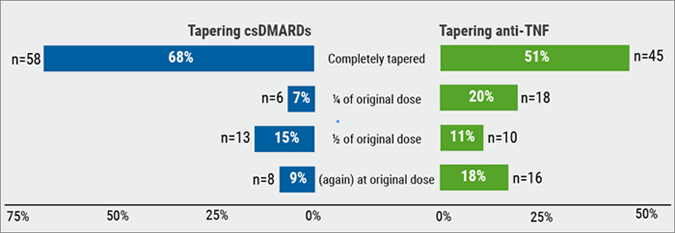“Early in the COVID-19 pandemic, hydroxychloroquine and chloroquine were promoted for treatment and prevention of SARS-CoV-2 infection, despite little evidence for their efficacy,” said Ms Emily Sirotich (COVID‐19 Global Rheumatology Alliance Steering Committee and McMaster University, Canada) [1]. Based on data from the COVID‐19 Global Rheumatology Alliance Patient Experience survey, the prevalence and impact of antimalarial drug shortages were assessed. Furthermore, the potential link between the use of antimalarial drugs and a decreased risk of a SARS-CoV-2 infection in rheumatoid arthritis patients was studied.
Anonymously, 9,393 patients entered data about the type of their rheumatic disease diagnosis, medication, COVID-19 status, and disease activity, as well as information about physical and mental health via the Patient-Reported Outcomes Measurement and Information System (PROMIS).
The participants had a mean age of 46.1 years, 90% were female, 41.2% used medication containing antimalarials, and the most common diagnoses were systemic lupus erythematosus (38.9%) and rheumatoid arthritis (38.6%). A positive COVID-19 status was reported by 5.5% (n=519) overall; 6.7% in the group using antimalarials and 4.7% in those only using other drugs. Of the COVID-19-positive study subjects treated with antimalarials, 10.8% were hospitalised and 13.1% received antimalarials as COVID-19 treatment.
“In summary, 6.2% of patients taking antimalarials were unable to continue taking their medication, due to a lack of supply of their pharmacy,” Ms Sirotich summarised. In contrast to patients not on antimalarials, these patients had significantly higher activity of their rheumatic disease, worse physical, and poorer mental health (P<0.001 for all comparisons). Moreover, taking antimalarials for rheumatic disease did not protect the participants from COVID-19 as such, or hospitalisation for COVID-19.
“The unintended harmful consequences of repurposing antimalarials, without adequate evidence for benefit, highlights the importance of maintaining scientific rigour even in the context of a pandemic,” Ms Sirotich stressed.
- Sirotich E, et al. Antimalarial drug shortages during the COVID-19 pandemic: results from the Global Rheumatology Alliance Patient Experience survey. P0007, ACR Convergence 2020, 5-9 Nov.
Posted on
Previous Article
« Ultra-early tranexamic acid of no benefit for subarachnoid hemorrhage Next Article
Children with rheumatic disease have no greater risk of a COVID-19 infection »
« Ultra-early tranexamic acid of no benefit for subarachnoid hemorrhage Next Article
Children with rheumatic disease have no greater risk of a COVID-19 infection »
Table of Contents: ACR 2020
Featured articles
Late-Breaking News
Gout treatment with febuxostat: no higher cardiovascular mortality
New agent with great potential for the treatment of giant cell arteritis in the pipeline
Autotaxin inhibitor successful in the first trial in diffuse cutaneous systemic sclerosis
JAK inhibition as a treatment option for ankylosing spondylitis
Spotlight on Rheumatoid Arthritis
Persuasive long-term results for JAK inhibition in rheumatoid arthritis
Rheumatoid arthritis: new EULAR treatment guidelines
Rheumatoid arthritis and interstitial lung disease: a deadly combination
COVID-19 – What Rheumatologists Need to Know
COVID-19 in patients with rheumatic disease: most report mild disease
Poor disease control: a risk factor for severe COVID-19
No heightened outcome risk for rheumatic patients with COVID-19
What Is Hot in Lupus Nephritis?
Lupus nephritis biomarkers: moving toward an omic-driven approach
Lupus nephritis: new therapies on the horizon in 2020
Spondyloarthritis – The Beat Goes On
Artificial intelligence can help in the diagnosis of axSPA
Resolution of dactylitis or enthesitis is associated with improvements in joint and skin symptoms
Promising novel treatment option for psoriatic arthritis
How to Diagnose Large Vessel Vasculitis: Promises and Pitfalls
How to choose imaging modalities in large vessel vasculitis
Diagnosis of large vessel vasculitis with imaging
Osteoarthritis – Novel Developments
Knee osteoarthritis patients with indicators of inflammation could profit from methotrexate
Anticoagulation with vitamin K antagonist is associated with risk of knee and hip replacement
Osteoporosis – New Data
Bisphosphonate use: Asian American women have a smaller treatment benefit
Inflammatory disease as a risk factor for fractures
Best of the Posters
No progression of osteoarthritis with corticosteroid injections
Hydroxychloroquine use: no indication for arrhythmias in RA and SLE patients
Children with rheumatic disease have no greater risk of a COVID-19 infection
Insufficient antimalarial supply for rheumatic disease treatment in the early COVID-19 pandemic
Related Articles
November 22, 2024
Positive results for vagus nerve stimulation in RA

© 2024 Medicom Medical Publishers. All rights reserved. Terms and Conditions | Privacy Policy
HEAD OFFICE
Laarderhoogtweg 25
1101 EB Amsterdam
The Netherlands
T: +31 85 4012 560
E: publishers@medicom-publishers.com

